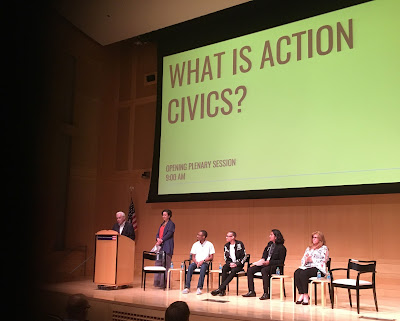In Search of a Symbiotic Relationship Between Parents and Teachers in Supporting Youth Civic Development
by Shawn P. Healy, PhD, Democracy Program Director
As a young boy, I developed an early interest in politics, thanks in part to the influence of my parents and grandparents. I recall my father bringing me along to the voting booth, my paternal grandmother taking two newspapers each day and faithfully watching gavel-to-gavel coverage of the party conventions, and my maternal grandmother meeting with her alderman at the kitchen table.
Now, with two kids of my own, I’ve tried my very best to pass the torch, modeling these same behaviors and demonstrating my daily commitment to strengthening democracy in Illinois through my work at the McCormick Foundation, teaching at the University of Illinois at Chicago, and service on a number of nonprofit boards.
Last week, as part of the 2017 Summer Convening of the Action Civics Initiative in Philadelphia, I was asked to participate in a Facebook Live session sponsored by Pearson to discuss how parents can support the diffusion of action civics principles (read the summary article here). They center upon student voice; deliberative discussion; real world interaction with local leaders, officials, and systems; and support for teachers and instructors through professional development opportunities, materials, and favorable policies.
The Guardian of Democracy report published by the Campaign for the Civic Mission of schools recommends that “parents…encourage their children to develop an interest in keeping themselves informed about current events; encourage their children to take an interest in and volunteer in their community; and help their children develop civic knowledge, skills, and habits.”
Guardian of Democracy also encourages parents to “…review civic learning opportunities in children’s schools,” a practice we’ve institutionalized at the McCormick Foundation through the Illinois Democracy Schools Initiative. Through a school-wide civic assessment process, students, teachers, administrators, community partners, and parents are asked to weigh in on their support for students’ civic learning opportunities and sense of the organizational culture at the school undergirding them.
Nationally, too many high school civics teachers (one in four according to the Center for Information Research on Civic Learning and Engagement) believe that parents or community members would object if political issues were discussed in their classrooms. When it comes to teaching about elections, only 28% of these educators feel that parents would provide strong support for this practice. This support is critical because teachers that have it are more likely to have open classroom environments and deploy deliberative practices.
According to researchers Michael McDevitt and Mary Caton-Rosser, “High school students…seem to thrive when teachers do feel they have enough community support to allow for (these types) of interaction.” Parents and teachers both clearly have a role to play in fostering students’ civic development and it should be seem as a “symbiotic,” not adversarial, relationship. The authors suggest that “…teachers…become more proactive in finding ways to enlist parents as partners in democratic education.”
To this end, McDevitt and Spiro Kiousis, in two separate articles, examine the interplay of students, parents, and schools in the political socialization process. In asking students to discuss elections-related news with parents, the authors find that "…Student-initiated conversation seems to awaken the civic parent in an adult, a role identity that might otherwise remain dormant…”
In sum, “The civic parenting phenomenon can be thought of as a mirror reflection of trickle up influence as the flow of influence moves in the opposite direction, from families to schools, with the child once again acting as a conduit for interpersonal political communication between the two parties."
More specifically, “Student-parent discussion appears to elevate the social utility or social value of paying attention to news media, and this increased motivation is not simply a fleeting effect.”
Thus, this symbiotic relationship between parents and school-based civic learning has mutual benefits for student and parent alike. It bears nurturing beyond teaching about elections and deliberative discussion, encompassing all of the action civics principles discussed above.





Comments
Post a Comment